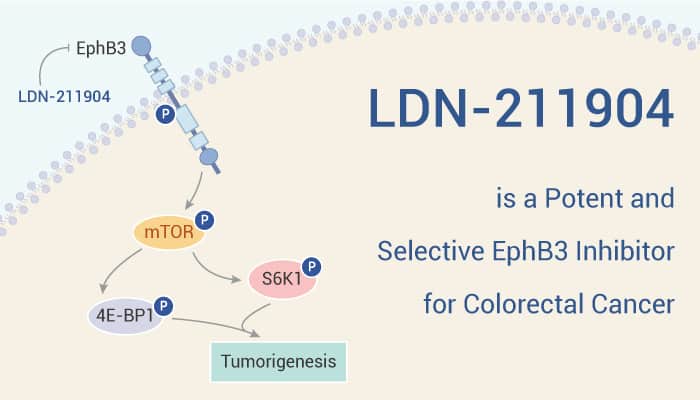LDN-211904 is a potent and selective EphB3 inhibitor with an IC50 of 0.079 µM. Besides, LDN-211904 oxalate shows good metabolic stability in mouse liver microsomes. What’s more, LDN-211904 oxalate with cetuximab could effectively inhibit STAT3-activated CSC stemness and cetuximab resistance in colorectal cancer.
LDN-211904 oxalate is a potent EphB3 inhibitor. Besides, it inhibits the phB3 phosphorylation of BTK-peptide with an IC50 value of 0.079 µM. What’s more, LDN-211904 oxalate (5 µM) also shows tyrosine kinases against a panel of two hundred and eighty-eight kinases. Besides, it also offers more excellent aqueous solubility due to the presence of a basic amine. Moreover, this compound displays excellent liver microsome stability with a t1/2 of 348 min and a CLint of 4 µL/min/mg protein. Furthermore, LDN-211904 oxalate inhibits EphB3 receptor autophosphorylation in HEK293 cells.

LDN-211904 oxalate with cetuximab shows antitumor activity in colorectal cancer.
Furthermore, LDN-211904 oxalate combines with cetuximab inhibits the proliferation of SW48 and SW48R cells. Moreover, LDN-211904 oxalate (0.1 mg/kg; i.p.; three times a week for 21 days) alone can inhibits cancer cell growth in cancer models, including xenografts. Besides, LDN-211904 oxalate combinates with 10 mg/kg cetuximab can overcome cetuximab resistance and inhibits tumor growth in SW48R cell tumor-bearing mice. What’s more, these results show that the EPHB3 pathway may be responsible for cetuximab resistance in CRC cells.
In conclusion, LDN-211904 oxalate is a potent and selective EphB3 tyrosine kinases inhibitor. Besides, LDN-211904 oxalate shows good metabolic stability in mouse liver microsomes. Additionally, LDN-211904 oxalate shows an antitumor effect. What’s more, LDN-211904 oxalate combines with cetuximab can overcome cetuximab resistance.
Reference
[1] Qiao L, et al. Bioorg Med Chem Lett. 2009 Nov 1;19(21):6122-6.
[2] Park SH, et al. Theranostics. 2019 Apr 12;9(8):2235-2251.